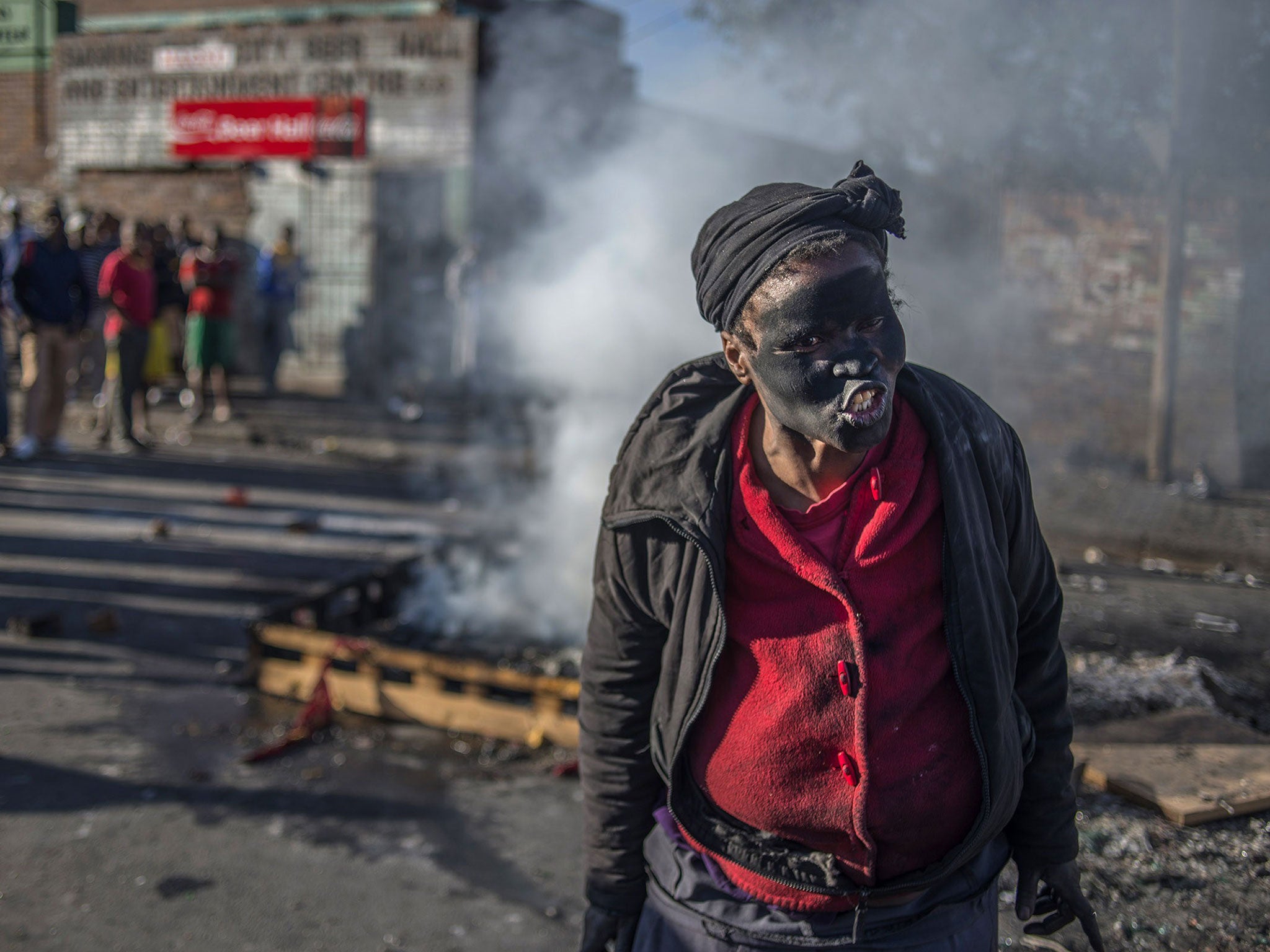South Africa violence: President Zuma appeals for calm as anti-immigrant unrest spreads
Clashes in Durban and Johannesberg leave five dead

The old demons have returned. In Isipingo, a group of African immigrants lay slumped on the ground surrounded by a crowd baying for blood. They were apparently beaten, stoned and burnt by black South Africans.
There are an estimated five million immigrants in South Africa. The largely ceremonial Zulu king, Goodwill Zwelithini, hopes there will be less. His followers, displaying loyalty and fealty, are thought to be behind many of the attacks in recent weeks. Clashes have been reported in Durban and Johannesburg.
Fears of further tensions and violence are growing, with thousands of immigrants from African nations seeking shelter at police stations, temporary camps and even a football stadium. Others have formed machete-wielding vigilante groups.
At an “imbizo” gathering of leaders in two days, Mr Zwelithini may attempt to defuse the crisis that, it is widely claimed, was prompted by his comments last month. “We are requesting those who come from outside to please go back to their countries,” he was reported to have said.
That fanned the flames in Durban, where Zulus comprise the largest ethnic group, and led to the worst scenes of unrest since January, when looters burnt down foreign-owned stores and clashes led to four deaths. In 2008, post-apartheid South Africa saw its worst bout of violence, when anti-immigrant hysteria led to the deaths of more than 60.
“Reckless and inflammatory public statements, such as those made by Zwelithini prior to the Durban violence, should be unambiguously condemned,” said a statement from Human Rights Watch. “And those who cross the line into direct incitement to violence against migrants should be prosecuted.”
South African’s immigrants come largely from other countries in the continent –including Zimbabwe, Zambia, Mozambique, Malawi, Tanzania as well as Ethiopia, Nigeria and elsewhere in sub-Saharan Africa. Bangladeshis and Pakistanis who came in search of sanctuary in South Africa, have also been attacked. After widespread rioting and at least five deaths, South Africa sought support from some of those neighbouring countries.
The unrest has spread to Johannesburg where police fired rubber bullets and a stun grenade to end a stand-off between South Africans and an immigrant vigilante group armed with machetes.
“We believe that working together we can defeat this demon,” the South African Foreign Minister, Maite Nkoana-Mashabane, said after meeting African diplomats in Pretoria.
Reuters reported that the Malawian government has hired buses to repatriate 500 of its nationals. The country’s Information Minister, Kondwani Nankhumwa, urged South Africa to provide greater protection for immigrants, echoing demands from China and the African Union.
Some 10,000 people attended a peace march denouncing the attacks on Thursday. Even then, the Natal Mercury reported that groups of bystanders along the route shouted “abahambe” (foreigners must go).
Kenya and some other African governments have also offered to evacuate any of their citizens who feel threatened.
In neighbouring Mozambique, a road leading to the South African border was temporarily blocked, and the petrochemicals group Sasol said it would repatriate 340 South Africans working in the country after protests about their presence.
The Premier of KwaZulu-Natal province, Senzo Mchunu, said that South Africans should not take advantage of Mr Zwelithini’s statement to attack non-South Africans living in the country. “We condemn the attacks on foreign nationals, but we also condemn any attack on our people,” he said.
The violence has been blamed on high unemployment, officially around 24 percent although economists say in reality, much higher, widespread poverty and glaring income disparities.
The South African President, Jacob Zuma, appealed for a calm on Thursday. “The attacks violate all the values that South Africa embodies, especially the respect for human life, human right. No amount of frustration or anger can justify the attacks.”
Subscribe to Independent Premium to bookmark this article
Want to bookmark your favourite articles and stories to read or reference later? Start your Independent Premium subscription today.

Join our commenting forum
Join thought-provoking conversations, follow other Independent readers and see their replies